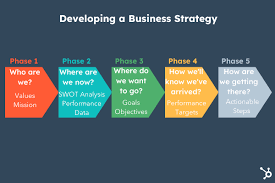The Importance of Business Strategy in Achieving Success
In the dynamic and competitive landscape of modern business, having a well-defined and effective business strategy is crucial for achieving success and sustaining growth. A business strategy serves as a roadmap that guides an organisation towards its goals and objectives, helping to align resources, capabilities, and actions to maximise performance and profitability.
One of the key benefits of a robust business strategy is that it provides clarity and direction to all stakeholders within the organisation. By clearly defining the company’s mission, vision, and strategic priorities, a business strategy helps employees understand their roles and responsibilities in contributing towards the overall success of the organisation.
Furthermore, a well-crafted business strategy enables businesses to anticipate market trends, identify opportunities for growth, and mitigate potential risks. By conducting thorough market research and analysis, businesses can develop strategies that leverage their strengths while addressing weaknesses to gain a competitive advantage.
Business strategies also play a vital role in fostering innovation and driving change within an organisation. By setting clear goals and objectives, businesses can inspire creativity among employees and encourage them to think outside the box to develop new products, services, or processes that differentiate them from competitors.
Moreover, an effective business strategy helps businesses adapt to changing market conditions and customer preferences. In today’s fast-paced business environment, companies must be agile and responsive to evolving trends to stay ahead of the curve. A well-defined strategy allows businesses to make informed decisions quickly and pivot when necessary without losing sight of their long-term objectives.
In conclusion, business strategy is not just a theoretical concept but a practical tool that drives organisational success. By developing a clear vision, setting strategic goals, and implementing actionable plans, businesses can navigate challenges effectively, seize opportunities for growth, and achieve sustainable success in today’s competitive marketplace.
Essential FAQs on Crafting and Implementing Effective Business Strategies
- What is a business strategy and why is it important?
- How can businesses develop an effective business strategy?
- What are the key components of a successful business strategy?
- How does a business strategy differ from a business plan?
- What role does innovation play in shaping a company’s business strategy?
- How can businesses align their operations with their strategic goals?
- What are some common challenges businesses face when implementing a new business strategy?
- How often should businesses review and revise their existing business strategies?
What is a business strategy and why is it important?
A business strategy is a comprehensive plan that outlines how an organisation aims to achieve its long-term goals and objectives. It involves setting strategic priorities, allocating resources effectively, and making decisions that align with the company’s mission and vision. Business strategy is important because it provides a roadmap for success, guiding the organisation towards sustainable growth and profitability. By defining clear goals and outlining the steps needed to achieve them, a business strategy helps companies stay focused, make informed decisions, adapt to market changes, and differentiate themselves from competitors. Ultimately, a well-crafted business strategy is essential for ensuring that a company remains competitive, innovative, and resilient in today’s dynamic business environment.
How can businesses develop an effective business strategy?
Developing an effective business strategy requires a comprehensive approach that involves careful analysis, planning, and execution. To begin with, businesses should conduct a thorough assessment of their internal capabilities, external environment, market trends, and competitive landscape. By gaining a deep understanding of these factors, businesses can identify their strengths, weaknesses, opportunities, and threats to inform their strategic decision-making process. It is essential for businesses to set clear and achievable goals that align with their mission and vision. Collaboration among key stakeholders within the organisation is crucial to ensure buy-in and commitment to the strategy. Regular monitoring and evaluation of the strategy’s performance are also vital to make necessary adjustments and improvements along the way. Ultimately, developing an effective business strategy requires a blend of foresight, adaptability, and strategic thinking to drive sustainable growth and success.
What are the key components of a successful business strategy?
When considering the key components of a successful business strategy, it is essential to emphasise several critical elements that contribute to its effectiveness. Firstly, a clear and compelling vision that outlines the long-term goals and aspirations of the organisation is crucial. This vision serves as a guiding light for strategic decision-making and helps align all activities towards a common purpose. Additionally, a thorough understanding of the market environment, including industry trends, competitor analysis, and customer needs, is vital for developing a strategy that capitalises on opportunities and mitigates risks. Furthermore, defining specific objectives, setting measurable targets, and establishing an actionable plan with allocated resources are essential components that ensure the strategy is implemented effectively. Lastly, regular monitoring, evaluation, and adaptation of the strategy based on feedback and performance metrics are key to ensuring its relevance and success in achieving sustainable growth and competitive advantage.
How does a business strategy differ from a business plan?
A business strategy and a business plan serve distinct yet interconnected purposes in the realm of business management. While a business plan outlines the specific steps and tactics required to achieve short-term goals and objectives, a business strategy focuses on the broader picture by defining the long-term direction and competitive advantage of an organisation. In essence, a business strategy sets the overall framework for decision-making and resource allocation, guiding how a company will position itself in the market and achieve sustainable growth. On the other hand, a business plan delves into the operational details, financial projections, and implementation timelines necessary to execute the strategic vision outlined in the business strategy. Ultimately, while a business strategy shapes the overarching vision and direction of a company, a business plan serves as a tactical roadmap to realise that vision through actionable steps and milestones.
What role does innovation play in shaping a company’s business strategy?
Innovation plays a pivotal role in shaping a company’s business strategy by driving differentiation, competitive advantage, and sustainable growth. Embracing innovation allows companies to develop unique products, services, or processes that set them apart from competitors and attract customers. By fostering a culture of creativity and continuous improvement, businesses can stay ahead of market trends, anticipate changing customer needs, and adapt to evolving technologies. Innovation also enables companies to explore new markets, expand their offerings, and diversify revenue streams, ultimately enhancing their long-term viability and success in the dynamic business landscape.
How can businesses align their operations with their strategic goals?
To align their operations with their strategic goals, businesses must first clearly define their strategic objectives and communicate them effectively throughout the organisation. This involves ensuring that all employees understand the overarching vision and how their individual roles contribute to achieving it. Businesses can then align their operations by developing key performance indicators (KPIs) that measure progress towards strategic goals and regularly monitoring and evaluating performance against these metrics. Additionally, fostering a culture of collaboration, innovation, and continuous improvement can help ensure that operational activities are in sync with the broader strategic direction of the business. By integrating strategic goals into day-to-day operations, businesses can enhance efficiency, effectiveness, and ultimately achieve long-term success.
What are some common challenges businesses face when implementing a new business strategy?
Implementing a new business strategy can present several challenges for organisations seeking to drive change and achieve their goals. One common challenge is resistance to change from employees who may be comfortable with existing processes and hesitant to embrace new ways of working. Ensuring buy-in from all levels of the organisation and providing adequate training and support are essential in overcoming this obstacle. Additionally, aligning the new strategy with the company’s culture, values, and resources can be a challenge, as it requires careful planning and communication to ensure a smooth transition. Another common challenge is measuring the effectiveness of the new strategy and adjusting it as needed based on feedback and performance metrics. By addressing these challenges proactively, businesses can enhance their chances of successful strategy implementation and long-term growth.
How often should businesses review and revise their existing business strategies?
Regular review and revision of existing business strategies is essential for the long-term success and sustainability of a company. The frequency at which businesses should revisit their strategies can vary depending on factors such as market dynamics, competitive landscape, technological advancements, and internal capabilities. However, as a general guideline, businesses are advised to conduct a comprehensive review of their business strategies at least annually. This periodic reassessment allows companies to evaluate the effectiveness of their current strategies, identify areas for improvement or adjustment, and align their plans with changing external conditions. By staying proactive and adaptive in reviewing and revising their business strategies, companies can stay agile, competitive, and better positioned to achieve their goals in a rapidly evolving business environment.



